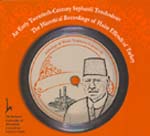New 4-CD Haim Effendi set from Jerusalem via Joel Bresler
Eva Broman spotted this wonderful new set:
A Must-Have Recording for Anyone Interested in the Sephardic Musical Heritage
 An Early 20th-century Sephardi Troubadour:
The Historic Recordings of Haim Effendi of Turkey
An Early 20th-century Sephardi Troubadour:
The Historic Recordings of Haim Effendi of Turkey
In 1907, the Odeon recording company in Turkey released the first record by Haim Effendi, one of the very earliest recordings of Judeo-Spanish music. The name of Haim Effendi (1853–1938) was known among devoted aficionados of Sephardic music, but to this day virtually none of his recordings were available to the general public. This re-release of almost 60 of Haim Effendi's songs offers the public a rare opportunity to hear his voice and appreciate the variety of his repertoire.
This new edition includes liturgical and paraliturgical pieces, romances and other songs in Judeo-Spanish from Turkey and the Balkans as they were recorded in the first three decades of the 20th century. In this format, these songs and prayers were probably heard in the private homes, synagogues, social gatherings and cafés of Sephardic Jews in the late Ottoman Empire.
The present recording was twenty years in the making and was made possible thanks to Joel Bresler, the founder of www.sephardicmusic.org. Bresler collected Haim Effendi's 78 rpm records from various sources and initiated their digitization. Dr. Rivka Havassy from Bar-Ilan University and Prof. Edwin Seroussi from Hebrew University added extensive notes on Haim's life and work.
Price: $30 (4 CDs plus 100 pp. booklet)
The recording is available at the “Eight Note” stores throughout Israel or
At the Jewish Music Research Centre through the website,
www.jewish-music.huji.ac.il, or by mail, at POB 39105, Jerusalem. Israel 91390. You can order by fax, at: 972-2-5611156
Joel Bresler adds: "The notes by Dr. Havassi and Prof. Edwin Seroussi are truly a landmark." Anyone who knows of the work of these scholars will find this likely to be an understatement.